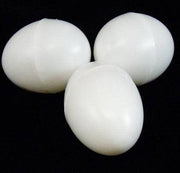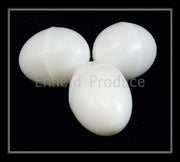Suitable as a deterrent for poultry hens that break/eat their own eggs. Weighted with sand inside to mimic a real chicken egg. Weighs about 23 grams.
Plastic poultry eggs can be a helpful tool for poultry breeders in a variety of ways. Here are some of the main reasons breeders might use plastic eggs, as well as some benefits:
1. Encouraging Nesting Behavior
-
Purpose: Plastic eggs can be placed in the nesting boxes to encourage hens to lay their eggs in the correct spot. They mimic the appearance and shape of real eggs, giving hens a visual cue for where to lay.
-
Benefit: This helps with egg collection and reduces the likelihood of hens laying eggs in undesirable places (such as outside the coop or in hidden areas).
2. Preventing Egg-Eating
-
Purpose: Sometimes hens may eat their own eggs, which is a habit that can be hard to break. Placing a plastic egg in the nest may help deter this behavior, especially if the egg is broken open.
-
Benefit: A plastic egg that doesn’t break or spill is less likely to cause hens to associate eggs with food, helping reduce egg-eating tendencies.
3. Training Young Hens
-
Purpose: When introducing young hens to laying, plastic eggs can serve as a way to guide them. It helps the young birds understand the nesting process and gives them a model to follow.
-
Benefit: It’s a helpful way to train young hens without the risk of losing real eggs, particularly if the young birds are hesitant or confused about laying.
4. Egg Incubation
-
Purpose: Plastic eggs can be used in incubators, either to fill spaces to ensure uniform heat distribution or to replace lost or damaged eggs in a clutch.
-
Benefit: In cases where a breeder wants to prevent the other eggs from rolling around too much, plastic eggs can act as fillers, ensuring a more stable environment for incubation.
5. Testing Broody Hens
-
Purpose: If a breeder wants to check whether a hen is broody (i.e., has the instinct to sit on and incubate eggs), placing plastic eggs in the nest can help test if the hen will sit on them.
-
Benefit: It allows breeders to observe broody behavior without using real eggs, helping avoid the risk of real eggs being damaged.
6. Preventing Cracked Eggs
-
Purpose: Using plastic eggs in the nest reduces the likelihood of a hen accidentally cracking a real egg. In case of hens that lay eggs with thin shells or tend to break their eggs when they lay, plastic eggs can offer a safer alternative.
-
Benefit: This can help improve the overall egg production by preventing wastage due to cracked eggs.
7. Durable and Easy to Clean
-
Purpose: Plastic eggs are easy to clean and disinfect, which is important for maintaining good hygiene in the poultry environment.
-
Benefit: Unlike real eggs, they don't attract bacteria, and they can be reused multiple times, making them a cost-effective choice for breeders.
8. Monitoring Egg Production
-
Purpose: By using plastic eggs, breeders can easily track the number of eggs laid and observe patterns in production, especially if they have a larger flock.
-
Benefit: Having a consistent reference point for the number of eggs laid helps in monitoring the health and productivity of the hens.
Things to Keep in Mind:
-
Realistic Appearance: Not all plastic eggs are created equal. It's important to choose high-quality, realistic-looking eggs that closely resemble real eggs in size, weight, and appearance to be effective.
-
Egg Size and Color: Make sure to select plastic eggs that match the size and color of the breed you're working with to avoid confusing your hens.
Would you like more specific recommendations on where to purchase them or tips on using them effectively for your flock?
Frequently Asked Questions:
Why are my chickens eating their own eggs? Hens can develop this habit after eating an egg that gets cracked accidentally giving them a taste for eggs or it may be due to a nutritional deficiency, though the former reason is more common. Dummy eggs can be used to break the habit of a hen that is eating their own eggs.
How do help prevent my chooks from eating their own eggs? To help prevent this problem its suggested to provide a secure nest box for your hens to lay in with soft bedding like straw to keep eggs safe. Also, provide a well-balanced diet and mineral supplements like calgrit.


